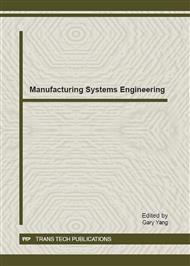p.154
p.159
p.165
p.172
p.179
p.186
p.190
p.195
p.200
Channel Estimating Based on Space-Time-Frequency Pilot for MIMO-OFDM
Abstract:
The pilots that are transmitted by different transmitting antennas must be orthogonal after being shifted. So the time domain channel estimating solution is deduced through LS based on the MIMO-OFDM channel estimating model. The time domain solution need the inverse operation of matrix, and its operating quantity is large. So the three dimensions pilot based on space domain, time domain and frequency domain is designed. The method need not the inverse operation of matrix for the time domain channel estimating solution and can reduce the complexity of channel estimating and make the channel estimating error minimum. It is shown from the simulation that the channel estimating method of this paper based on space domain, time space and frequency domain pilot has better MSE and BER performances compared with the traditional LS algorithm and the document algorithm.
Info:
Periodical:
Pages:
179-185
DOI:
Citation:
Online since:
January 2012
Authors:
Keywords:
Price:
Сopyright:
© 2012 Trans Tech Publications Ltd. All Rights Reserved
Share:
Citation:


